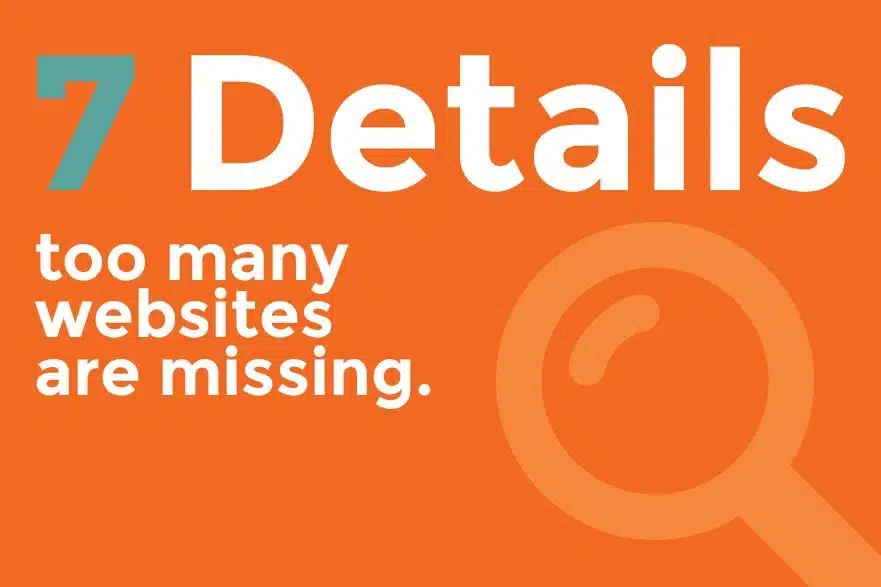

A lot of work goes into website design. From choosing colours that match your organization’s branding, to typography, to picking that perfect hero image for your homepage.
In the rush to look amazing and start getting links and traffic, a lot of things can go missing – let’s look at some of the most common lost elements we see on websites these days.
1.) Complete, concise contact info
Including clear, detailed, and precise contact information on your website – and making sure it’s reflected accurately on other properties such as review websites and local business listings – is really important. It’s also something a lot of businesses get wrong.
A recent study from Mediative suggests that “80% of Canada’s top retailers’ local listings are inaccurate.” It’s damning, but it also reveals an opportunity for small businesses to outdo the big ones on an important level.
The level of detail we can include, especially using microdata such as Schema.org and network-specific markup, is very impressive – and it goes a long way toward improving your visibility on local web searches.
2.) Analytics
“Half the money I spend on advertising is wasted; the trouble is I don’t know which half.”
Marketing intelligence is one of the “usual problems” businesses face. Sure, you take a bunch of actions, and business grows. But how effective is each action? Which should you keep up, or invest more in, and which should you let slide?
No matter which tools you’re using, web analytics provide the insight that makes digital marketing so powerful; it gets you closer to understanding which half of your dollar is well spent.
3.) Company info pages
The classic About page may be cheesy, but it’s useful. Providing information about your business – especially from a human angle with Team and company history pages – allows you to showcase a side of your organization that doesn’t always get room to breathe elsewhere.
4.) Sitemaps
Not every website needs an intensive “You Are Here” list of every link in its hierarchy – the classic /sitemap.htm is not what we’re talking about here.
XML sitemaps are an important part of connecting your website to search, particularly with tools like Google’s Search Console. They provide a basic list of all the important pages on your domain, and give crawlers a jumping off point to start indexing your content.
5.) Mandatory utility pages
Are you selling a product or service through eCommerce? Does your website include a membership area that collects potentially identifying information from users?
Legislation varies depending on where you operate, but the fact is that if you’re collecting information from people (and in some cases, this can even include using Analytics software), your website is probably in need of a privacy policy page at the least, if not more documentation like Terms of Service.
6.) Deeper “pillar content” pages
As much as we love to blog, not everything belongs in a serialized snackable-content form. Websites benefit from having bigger, more in-depth content that people can soak up, and that you can link to from other assets.
Deep dives on services offered, big and complicated subjects, even sales pages – they deserve to have a home of their own. Whether you’re really getting to the guts of why someone should buy the specific type of insurance you’re selling, or doing a sharp feature-based comparison between your product and a competitor’s… Blogs make no sense here; choose a better format.
7.) A “What Next” Button
Not all CTAs need to be firm sells. Users benefit from knowing what to do next at the end of your pages. Related articles, links in blog posts and pages, even footer navigation all do this job when designed properly.
Chances are, even if you’ve got a visitor on a product page, that’s not the last thing you want them to see before they leave; you want them to interact with your business, make a purchase, download something, or keep reading. Let them know where to go – it’ll make a difference for both of you.
Between two equally beautiful websites, it’s often the details that are the tie-breakers.
Google’s said as much about things like HTTPS – it may not help your rankings day to day, but all other factors being equal, can act as the dealbreaker between evenly matched pages.
Who doesn’t like having the details on their side?
Source: Hello BLOG
Recent Articles
Write For Us
Think you’ve got a fresh perspective that will challenge our readers to become better marketers? We’re always looking for authors who can deliver quality articles and blog posts. Hundreds of your peers will read your work, and you will level up in the process.Ready to grow? Say Hello








